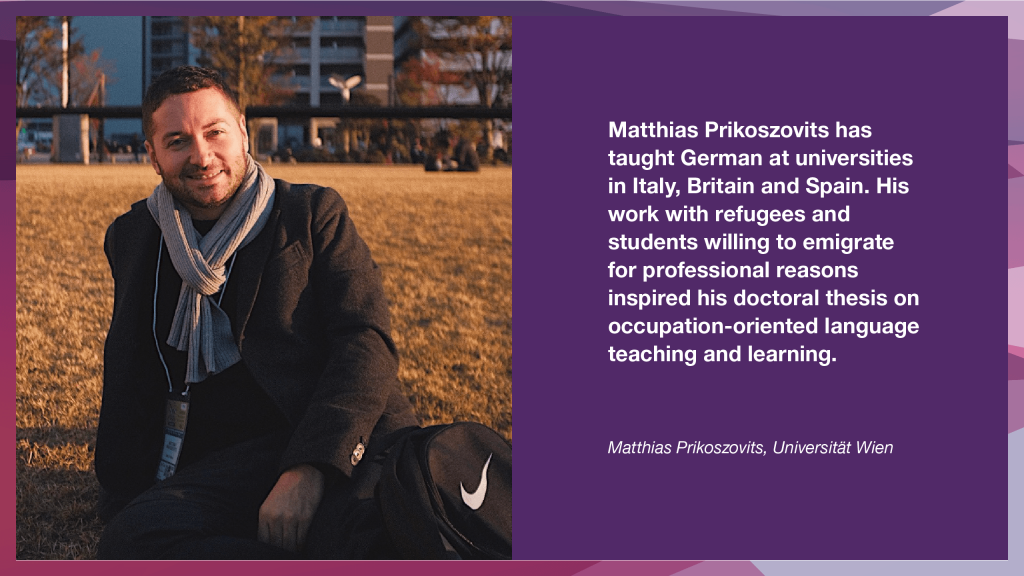At The Japan Association for Language Teaching (JALT), Sieon Lau (SL) talked to Matthias Prikoszovits (MP) from Universität Wien about language teaching for refugees, the need for mobile learning, and research on vocational training.
SL: It’s good to see you here at JALT, Matthias. Tell us about yourself.
MP: It is a pleasure, Sieon. I have been teaching German as a foreign language at universities in Italy, Great Britain and Spain. In the past I have also taught refugees. My work inspired me to write a doctoral thesis about occupation-oriented language teaching and learning. This is an important issue in Southern Europe because of various economic and social issues happening right now.
SL: Tell us about your experience of language teaching for refugees.
MP: I have taught both refugees who had and had not attended school in their countries of origin. This means I have worked with illiterate adults and it was very interesting to see how they made big advances in German. Some of them were not used to studying in the context of a classroom or were not even alphabetised in their native language. They are from countries like Afghanistan or Somalia. The atmosphere was very warm all the time. At the end of each course they’d always bring traditional food from their countries and spoil me.
SL: I presume a lot of your students were A0 to A1 level. What were your strategies and what do you think these students need the most support on?
MP: Well, with certain groups I had to start with the letters of the alphabet. I used different colours and drawings or pictures to facilitate their learning processes. I wanted them to realise that the classroom is a safe environment where they don’t have to be afraid to make mistakes and where they always get support.
They not only needed language support, but also cultural support, getting familiar with the country they have come to live in. So, we made a lot of excursions in Vienna. We went to museums and other cultural institutions, but also to companies — for instance to a bakery, where they could speak to people working there and learn about working life in Austria.
SL: Here at Clarity we are interested in how mobile learning can help students with limited resources. Do you see mobile learning as the way to go?
MP: Absolutely. Refugees often have good skills dealing with mobile devices. Many of them cover countless kilometers by foot and need phones for orientation. By introducing them to mobile language learning you can make them realise that learning can be done anywhere, at any time and autonomously with any mobile device.
SL: Do you have any advice for content developers like us?
MP: In my opinion you should focus on tools or apps that are easy to use and that encourage autonomous, interactive language learning. Ideally, there would be a combination of mobile learning and project work. Such combinations can be useful to gain skills that are necessary in working life. I think refugees might also need to gain vocation-oriented key qualifications such as time management or conflict resolution.
SL: So, can you tell us about this research that has led you to travel all across Europe?
MP: It’s my doctoral thesis. I wanted to find out whether higher education German language courses in Spain and Italy had begun placing a stronger focus on the occupational and vocational aspects after the 2008 crisis.
I researched Spain and Italy as these were countries which were economically vulnerable after the economic crisis. The crisis led to a significant increase in unemployment rates, particularly among the younger population. As a consequence, many young Italians and Spaniards, including university graduates, emigrated to countries in which German is an official language. However, many of the people seeking jobs didn’t have the language skills required for the posts they were applying for. This is the starting point for this doctoral thesis.
And my prediction was right: the thesis was able to show an increase of occupation-oriented elements in higher education curricula for German as a foreign language in Italy and Spain in that period. And of course, I needed to travel to Italy and Spain to validate my findings and give talks about the thesis.
SL: At JALT, you talked about the importance of teaching vocation-based language skills such as translation and applying for medical insurance. Tell us more about this.
MP: During my research I realised at various points how important translational skills are in professional contexts. Yet experts and researchers in vocational language teaching seem to neglect this skill. Applying for a job and writing a CV are, of course, important topics to focus on, but there is so much more to job-related content. Cultural knowledge is crucial in vocational contexts, for example. The dos and don’ts at a business dinner may vary from culture to culture.
It is also helpful to know your rights and the insurance conditions in case of an accident in the workplace. In a foreign language you should know the most important words that frequently appear in contracts. In vocation-oriented language classes learners should also be prepared for the language used in further professional training and for further professional growth. So there are many aspects of occupation-oriented content that teachers and even researchers frequently overlook. And ideally, such content should also be integrated in language classes for refugees.
Since this interview, ClarityEnglish has worked on the HOPES Project – an initiative set up by European Union agencies to support Syrian refugees moving into higher education. You can read more about this project here.
Some skills mentioned in this interview, like time management, planning and prioritising, and independent learning, are covered in Clarity’s Study Skills Success. Read more about this program here.

